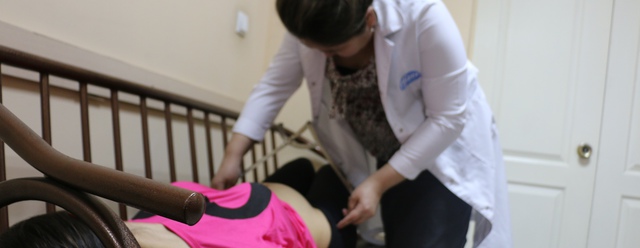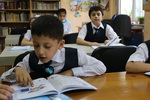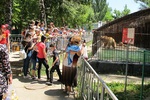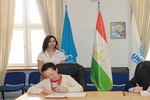Home > News of the Region > News
News

Prenatal health is not accessible for refugeesKhumaira, age 23, is a young refugee woman who is very happy awaiting the arrival of her first baby. She was only three years old when her family was forced to flee Afghanistan due to persecution and conflicts. Since then, she has been staying in Kazakhstan which became her second motherland. She has never thought that the happiest moment in her life could be clouded by the legislative barriers to receive prenatal care. “We are so happy that in four months we will see our first son, but his future is uncertain. Starting from the fact that we do not know where I will be delivering a baby, to uncertainty on how he will be receiving necessary medical treatment,” – says Khumaira. When Khumaira learned that she was going to have a baby, she approached the local medical centres, however medical assistance was denied due to her refugee status. Khumaira was informed that only Kazakh nationals have a right to receive health care services, including prenatal care, on a free of charge basis. It took her almost three months to be registered at a medical centre for regular pregnancy checks with the help of UNHCR partner, Kazakhstan Red Crescent Society (KRCS). Khumaira says that she is very lucky not to have any complications with her pregnancy. She is one of five pregnant refugee women who are facing challenges in receiving prenatal care in Kazakhstan. Since the adoption of the Unified National Healthcare System in 2010, access to free health to foreigners, including refugees and asylum-seekers has been limited to 21 acute diseases presenting a threat to public health. Antenatal and post-natal care is not included in the health services provided to foreigners free of charge under the newly introduced Health Care System. According to new rules, refugees can receive medical care only on a paid basis. However, due to limited employment opportunities refugees cannot afford paying for medical services which are very expensive. Khumaira’s husband says: “I do not have any permanent job and have very low income from temporary jobs. Thus, I cannot afford paying for every visit to a doctor or necessary medical tests. We are very grateful to the KRCS for their support in accessing the medical services”. UNHCR notes that denial of medical services to refugee and asylum seeking women can have a repercussion in the maternal mortality rate, and ultimately, affect socio-economic indicators of the Republic of Kazakhstan. UNHCR in partnership with the KRCS is assisting refugee and asylum seeking women. However, the attention that they can afford through the assistance provided by UNHCR and its partner is very basic as the resources are scarce. Anara, the KRCS Medical Coordinator says: “At the moment we have only five pregnant women, but the problem needs to be addressed on legislative level, because the funds we have are very limited, and I foresee that we will not be able to include all refugees and asylum-seekers for prenatal and postnatal care on a paid basis”. The KRCS signed an agreement with a private medical centre to allow access of refugees and asylum-seekers to prenatal care. UNHCR recommended the Government of the Republic of Kazakhstan to amend national legislation to provide refugees and asylum-seekers access to prenatal and postnatal care on a free of charge basis. So far, UNHCR’s recommendations remain unadressed. UNHCR continues its advocacy efforts to ensure refugees and asylum-seekers access to health care services on a par with nationals of the country. Khumaira and her husband are afraid to talk about the future of their family. They only tell that they are very happy that their son will be born in a country where there is no war. 05.05.2015 |

Refugee athletes compete for first time at Asian Games
25.09.2017

Refugee athletes prepare to compete at Asian Games in Turkmenistan, as Opening Ceremony takes place
18.09.2017

UNHCR supports the right of refugees to education
07.09.2017

Sowing Seeds of Hope
24.07.2017

UNHCR and Sheraton Setting Up Innovative Partnership
04.07.2017

The World Refugee Day 2017 in Almaty
29.06.2017

Reaching Out to Youth
16.06.2017

UNHCR at EXPO-2017 Astana
14.06.2017

Roundtable on Birth Registration
12.06.2017

JOINT COMMUNIQUE BETWEEN UNHCR AND UNICEF
02.06.2017

